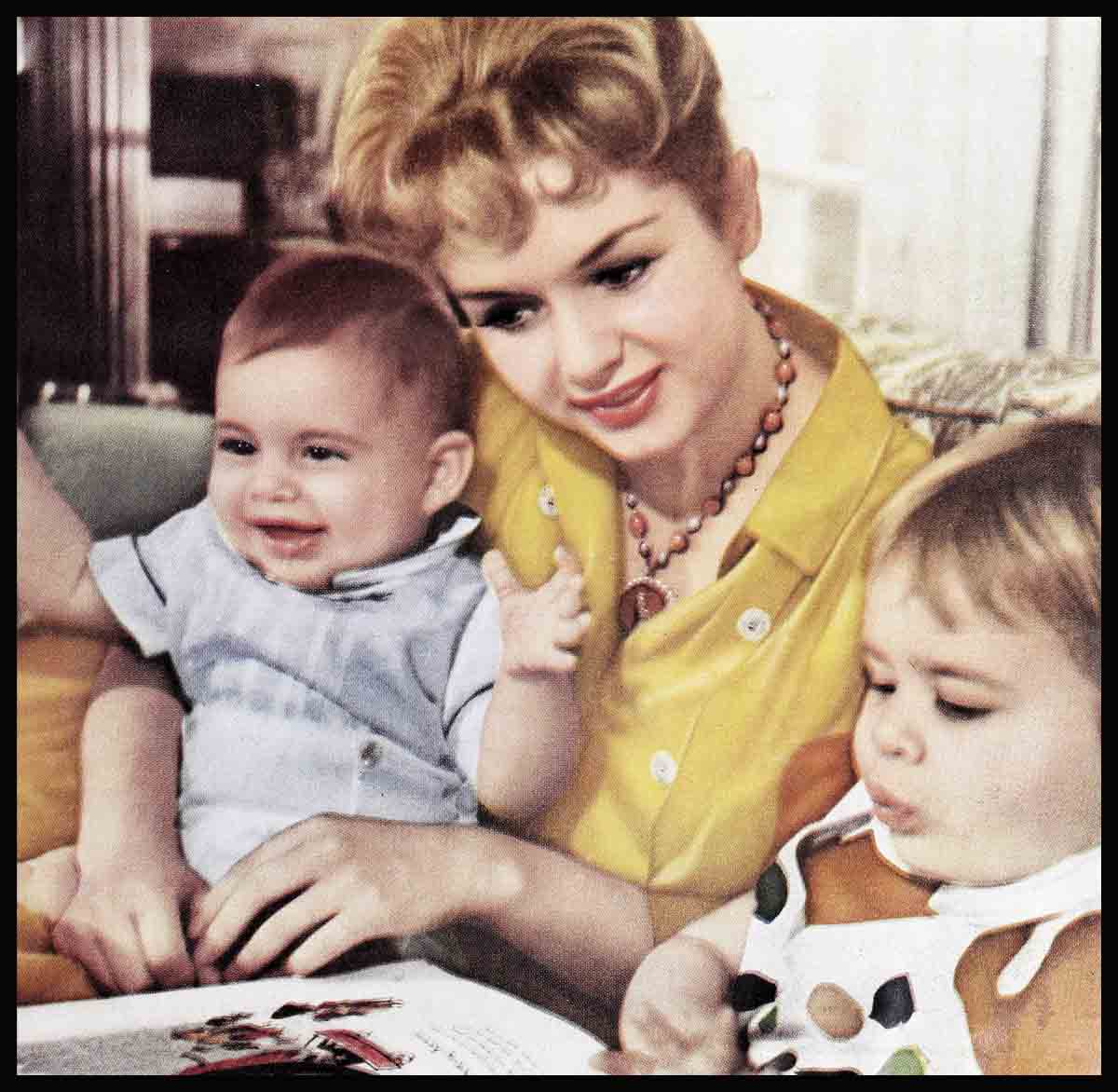
Debbie Reynolds: “I Wish Elizabeth And Eddie All The Happiness . . .”
Debbie had invited us to come over on Sunday, and it seemed a particularly warm and lazy
morning that day we went to Debbie’s house. “Just to talk about a lot of things,” we had said over the telephone.
“Fine,” she answered in her bright voice. “Could you come over at about eleven? Carrie will be in the garden . . . Todd will be asleep . . . so if you come at eleven. that would be just fine . . .” she said again, almost without taking a breath.
She gave us the number of the house, adding, “You’ve never been here before, it’s quite different from the enormous one in Beverly Hills. It’s a very nice comfortable house and you’ll probably see Carrie’s toys on the front lawn! You can’t miss it,” she added with a lilt to her laugh.
We weren’t as confident as Debbie about finding her home. We noted each house as we drove down the charming street in Holmby Hills, those of Early American or English architecture, each perfect and dignified, sturdily solid as though they had had many years of gracious living. The atmosphere was serene and hushed as it would be on a Sunday morning at eleven o’clock.
We recognized Debbie’s house almost immediately without hardly glancing at the number. It was an attractive English home of buff-colored brick, situated back from the sidewalk with a wide expanse of lawn. Trees shaded one side of the house, while brilliant flowers were planted all up and down each side of the brick walk. It was certainly a charming house. And, just as Debbie had said, Carrie’s doll carriage was casually propped up against a tree.

We rang the doorbell, and when the maid opened the door, Debbie called from upstairs.
“Hi . . . I’ll be down in a minute. My mother’s in the garden with Carrie . . .”
We couldn’t resist the opportunity of giving the interior a quick glance on our way to the garden. It was a restful interior, done in pale beiges and rose . . . the chintz drapes at the wide English windows . . . the large pieces of fine old mahogany furniture . . . the huge fireplace over which stood a row of pewter mugs. There were books and scripts on the tables . . . bowls of white flowers and a profusion of green plantings.
It was a warm and attractive room, where it seemed that Carrie must have been playing, for many of her toys were scattered across the floor. The entire atmosphere was of friendly charm and comfort. The garden was linked to the living room by an inside garden, which was filled with all kinds of plants of various shades of green. Arranged with these were exotic plantings of rare tubus begonias and fragile orchids . . . the hot-house variety of plants that need the most delicate care and live in cool shaded places. The whole arrangement was simply beautiful. It was like coming upon some exotic island in the middle of a very sensible and sturdily built English house.
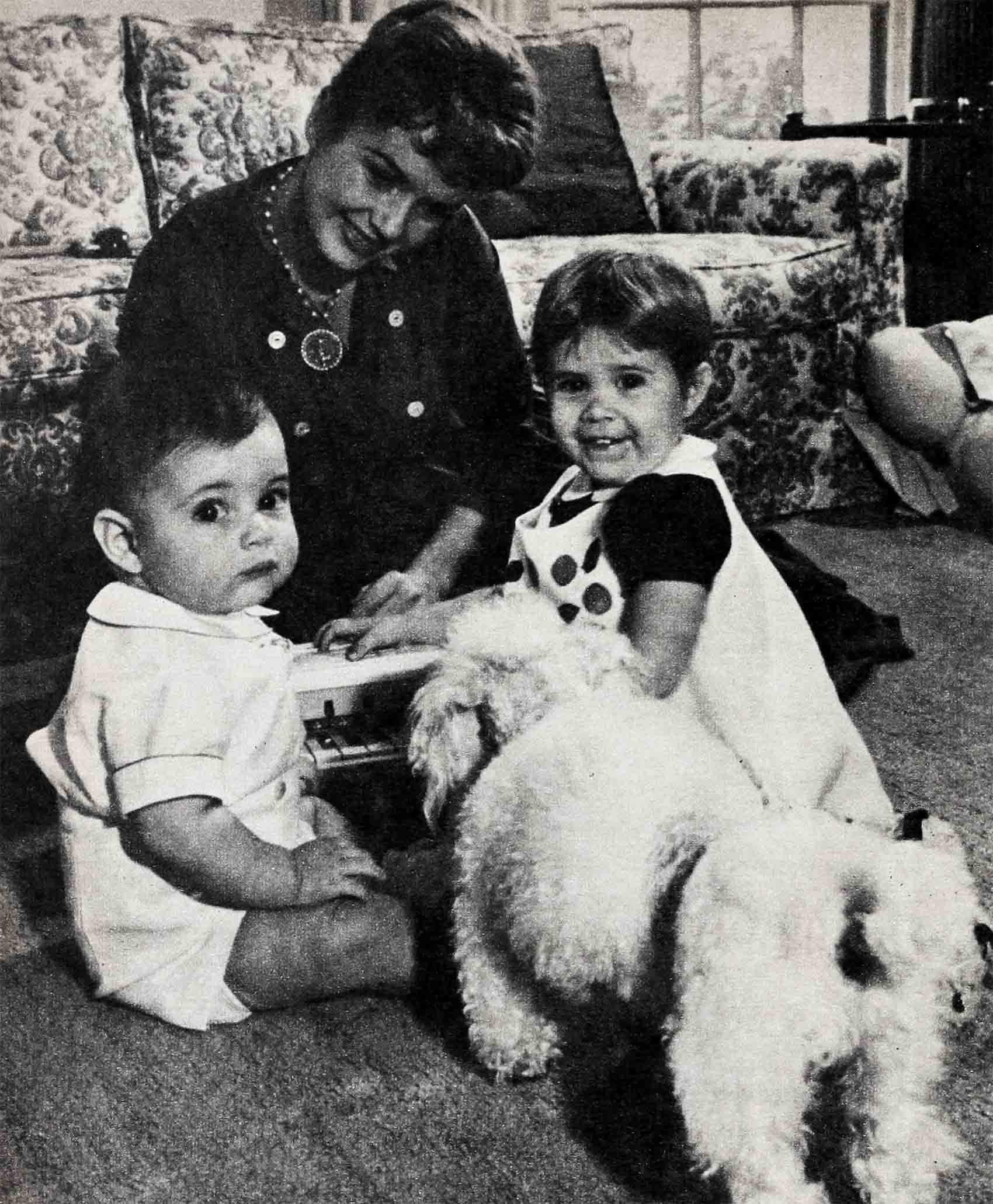
The garden was not very large. The kidney-shaped pool had a fence built around it for the children’s protection . . . some comfortable garden furniture was clustered on the grass and a sand play-box took up one corner. Toys were everywhere. There were miniature chairs, animals, and there was obviously no question that this was somewhere children could feel quite free to romp and play to their hearts’ content.
Carrie’s grandmother, the young-looking Mrs. Ray Reynolds, in her yellow flowered-silk slack-suit, was carrying on a very animated conversation with Carrie, who was busy toting dishes of sand both to her grandmother and to a young lady we didn’t know (who, we later learned, was from one of Debbie’s charity organizations). Mrs. Reynolds smiled warmly and came over and, smiling, said hello to us.
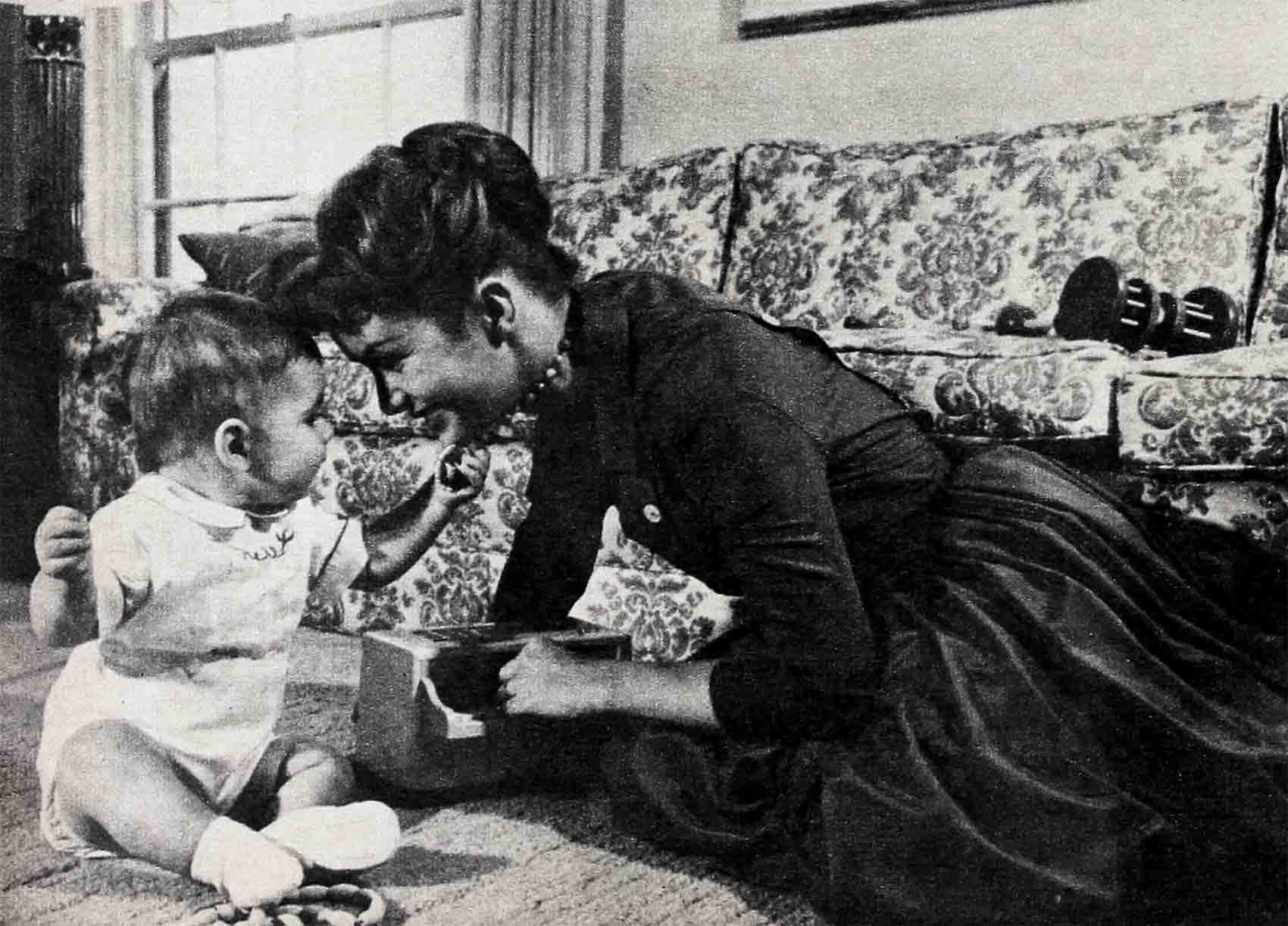
And then we were introduced to Carrie, a pixie of a little girl with fine, pale honey-colored hair combed into bangs across her forehead. She looks sturdy and yet doll-like. When one hears her speak so distinctly it is almost a shock to realize that the words are coming from a little bit of a girl, not quite three years old. She resembles her mother very much. “Excepting the eyes,” Mrs. Reynolds said. “Debbie’s are green, but Carrie’s eyes are dark brown.”
When we asked Carrie to give us a dish of the sand she had been energetically filling and spilling, she threw us a smile and immediately filled a tin, fish-shaped dish and presented it to us. She never stopped talking. Bits of words, some very clear, half talking to us, and half to herself, but as happy as a bird. When we asked her to show us her dolls, she cocked her head for a moment, smiling enchantingly as she pondered whether or not to leave the sandpile to get them. Finally agreeing, she said, “Okay . . . okay . . .” as she ran off to get the dolls. Her movements reminded me so much of Debbie’s.
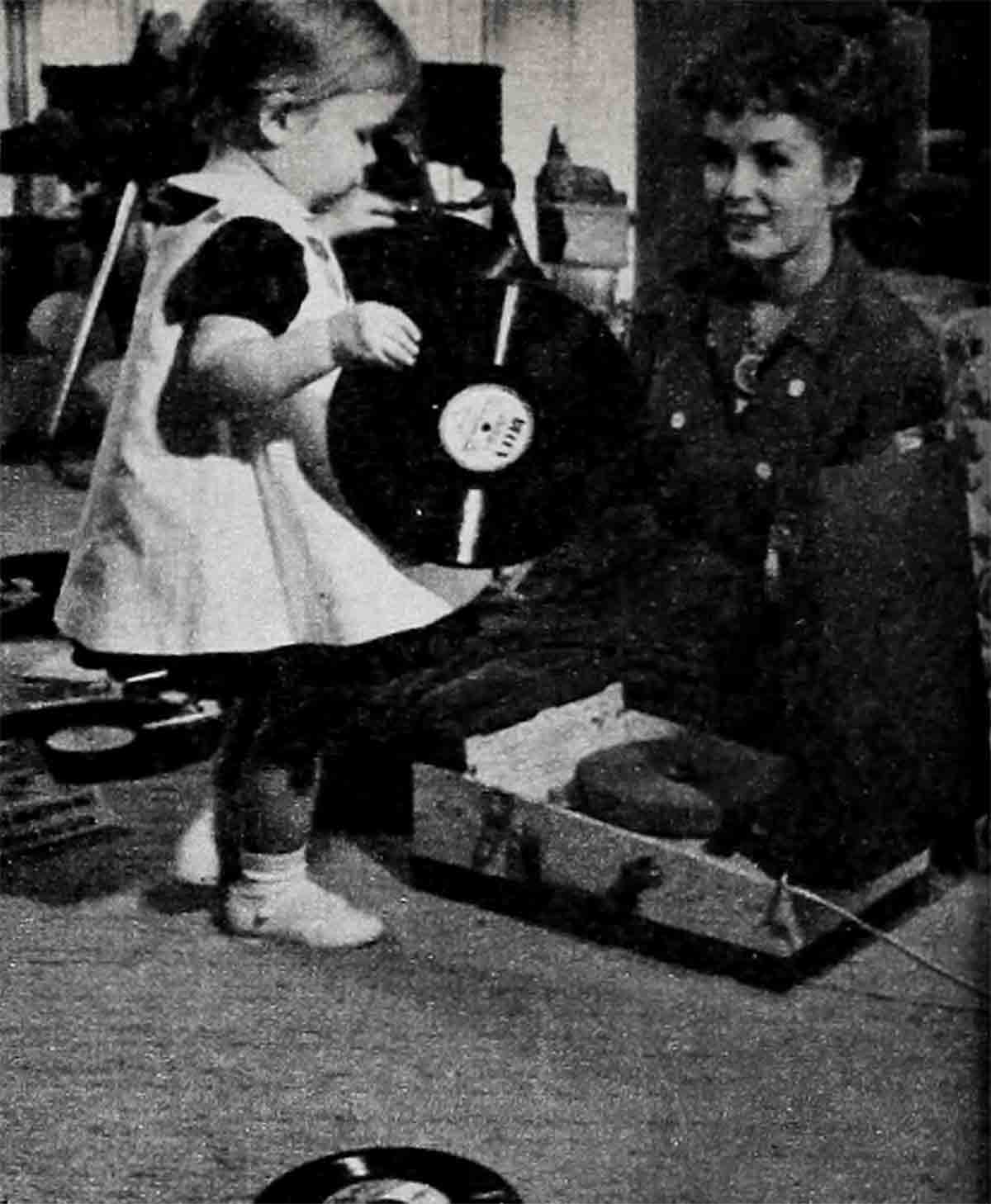
“She’s just like her mother,” Mrs. Reynolds remarked, with a twinkle, as though reading my thoughts, “Carrie and Debbie—both alike, and both of them busy all the time.”
When Debbie joined us in the garden, Carrie’s face lit up immediately. She rushed into her mother’s arms. Debbie kissed her fondly and said, “You stay out here, Carrie. I’m going into the living room for a little chat. Later, after you’ve had your lunch, we’ll go out for our walk. Okay?”
Inside Debbie sat up straight against the couch. The brilliant gold of her dress toned well with the muted shades of the chintz covering. She had a piquant look about her, and she wore her hair piled high on top of her head and coiled in a soft swirl, a row of bangs on her forehead. It didn’t seem to make her look older or more staid, or old-fashioned. It was really very pretty and soft. When we admired it, she said, “I never liked myself in short hair . . . my hair is very long now . . . I like it this way best.” We agreed with her. She looked like a movie star.

She seemed to sense how charming and comfortable we thought the house seemed, because she said softly, “I love it, too. And it has so many advantages. . . . It’s near a park where Carrie can play . . . there are other children on the street . . . and it’s quiet here, and not too far from Westwood Village for shopping . . .”
She curled her legs under her. “I think,” she said, casting her eyes around the room, “that this house looks like it has been lived in, and that’s how a house should look.”
Then we both looked at each other. She was waiting for the questions, but, at that moment, the phone rang, and Carrie kept wandering in and out, staying just long enough to lay her head on her mother’s lap and then ran outside again.
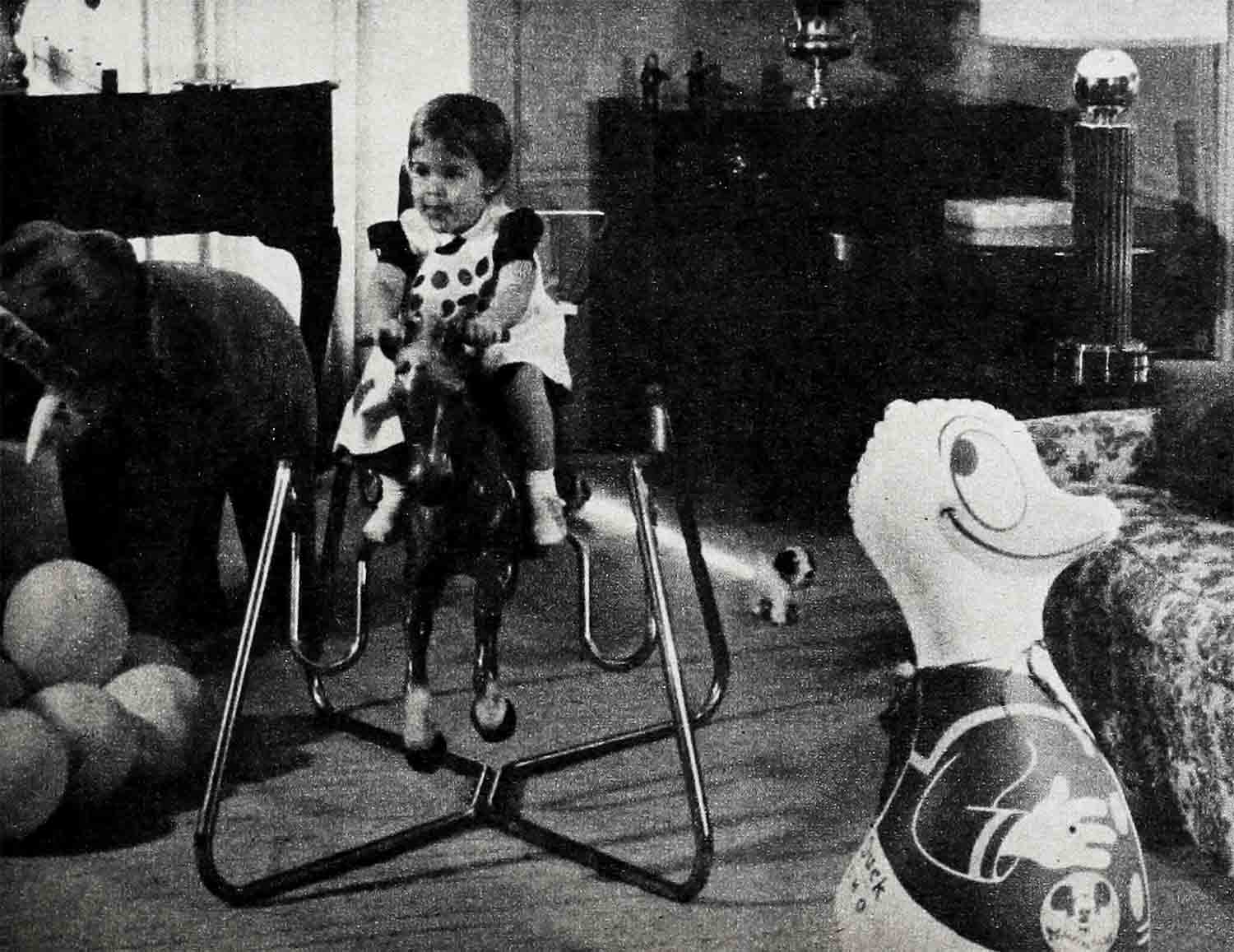
Finally, we said, “They say you do not wish to give any more interviews. Is that true?”
She admitted it was. “I have been stunned,” she said. “Stunned and hurt by so many of the things that have been printed . . . things the press did not even bother to check. I can’t and I don’t expect every member of the press to adore me. But I do feel I have the right to expect him to check a story before printing it.” She continued rather nervously. “I have always been grateful to reporters. I know how much they have done for my career. I have always tried to cooperate. . . . I always enjoyed giving interviews—it was sort of fun. But now I can’t feel the same way about it.”
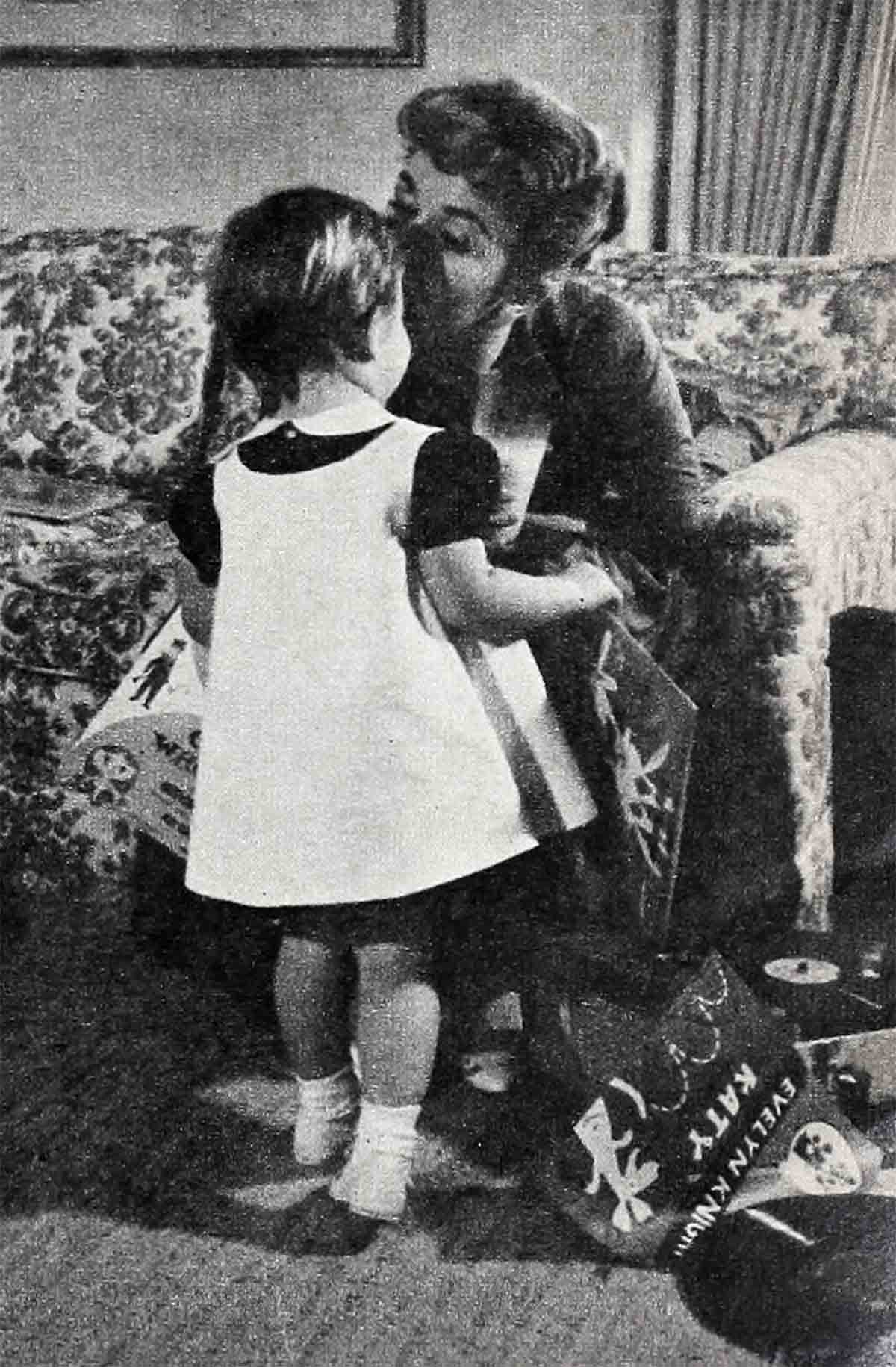
She got up suddenly and stared out into the garden. When she turned toward the room again, she said very quietly, “I’m not going to let it hurt me any more. I’ve got so much to be grateful for: my two children, my family. Every day I spend with Carrie and Todd is such a wonderfully happy day. We’re together a great deal of the time. But now, I’m so busy with my career, I won’t be able to be with them as much as I would like.
“I have a nurse for Todd and I love taking care of Carrie myself. I don’t find it difficult at all. And I think it’s very important to spend as much time as possible with children and not turn them over completely to the care of a nurse.”
Can you describe an average day with Carrie?” we asked. “When does it begin, and what do you usually do together?”
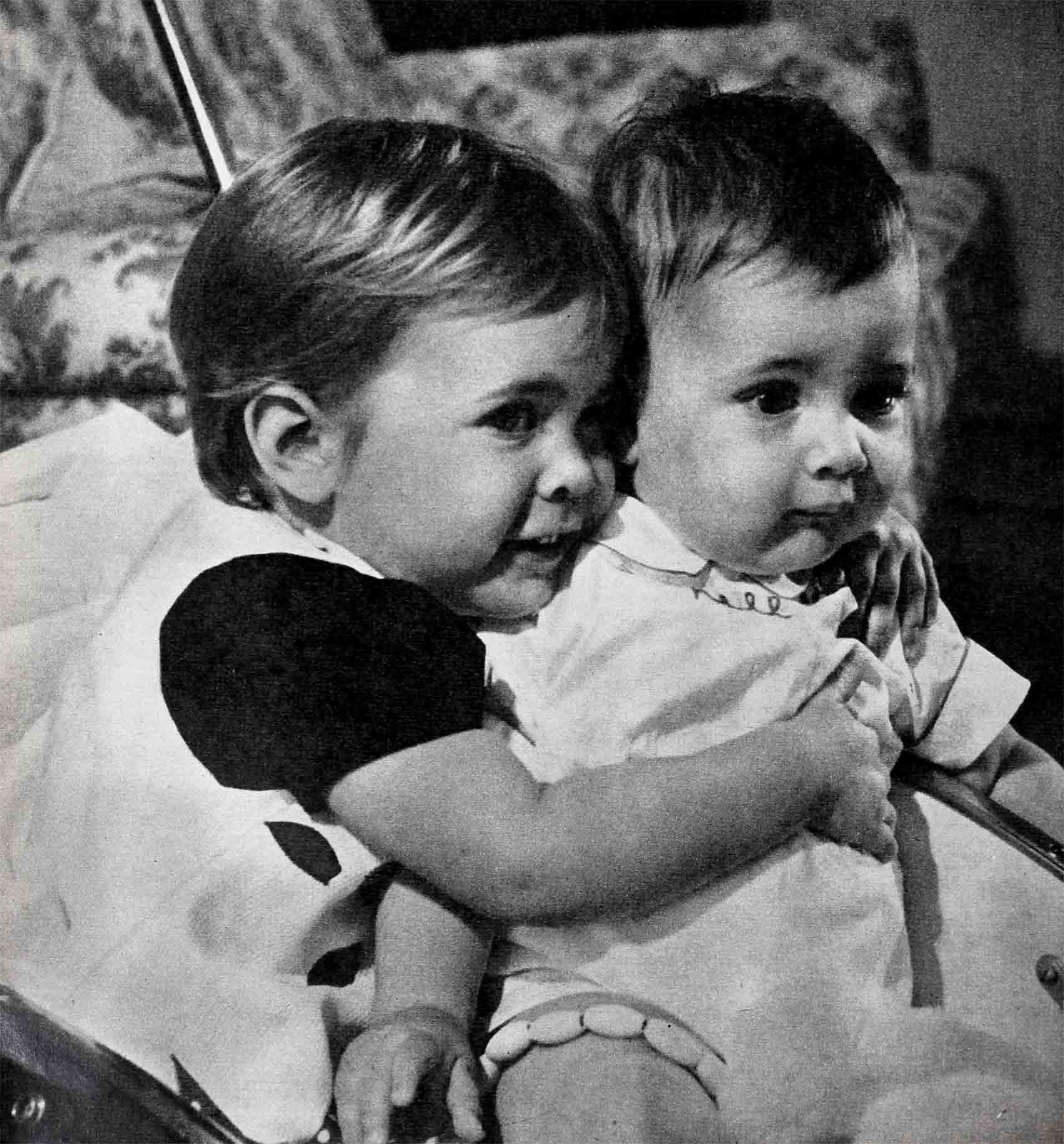
“Both of us are very early risers,” she laughed. “About 7:30 in the morning I hear her calling me, ‘Mummy . . . come . . . come, Mummy.’ So I get up, dress Carrie. She has her milk. I have my orange juice. We always have breakfast and lunch together and sometimes with Todd, too, now that he’s growing up. Carrie’s favorite dish is meat and potato chips. But Todd loves milk and graham crackers best. We have a regular routine. After breakfast I read my newspaper, and Carrie sits beside me looking through her picture book—she loves the ones with animals. Then we decide where we will take our morning walk. We go out for one hour. Sometimes she wants to go to the park or just down the street to pick some berries from her favorite bush. She’s crazy about that berry bush. We generally take Rocky with us . . . he’s our little four-pound poodle, you know. When Rocky gets tired of Carrie he just hides under a piece of furniture, where she can’t get at him, and stays there until he’s rested. Then he goes back for more rough and tumble.
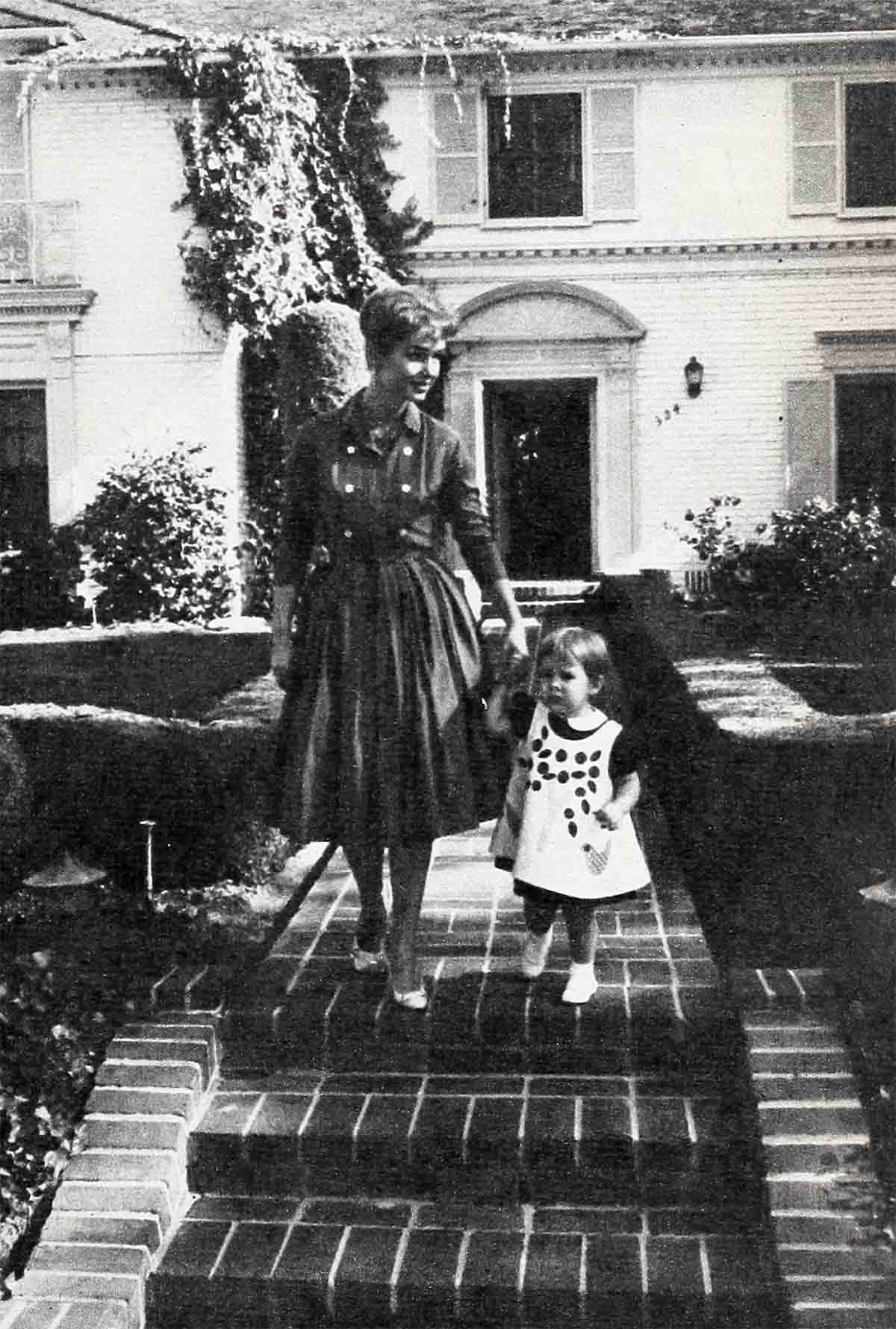
“We love to walk early in the morning. It seems the world has all kinds of adventures for Carrie. Those fascinating berries, for one thing, which she can’t resist picking, but then offers generously to me. Once she brought me a snail . . . and I had to take it, too,” Debbie said with a wry face. “She is very curious about everything . . . an interesting pebble, a tiny flower, some leaves. It’s wonderful to watch her earnestly turn them over in her hand and study them.”
As she spoke of her daughter she would cast a glance from time to time to the garden, where she could see Carrie playing.
“She’s really such an amusing little girl, and very musical. She loves to listen to all kinds of music. But she has a temper! Like me.” Debbie grinned. “She knows exactly what she wants, and if you try to stop her . . . wow! I used to let her walk down to her favorite bush by herself. It wasn’t too far away, and while I’d sit on our front steps reading the paper, one eye on her all the time, she’d keep running back and forth to me. Suddenly, one time, I looked up and she was way down the block crossing over to the other side of the street. I rushed after her, and when I caught up with her she was furious with me and howled at the top of her lungs. I don’t know what the neighbors thought of us making such a racket so early in the morning! You know how quiet most of these streets are. Every once in a while I catch Carrie trying to outwit me. She’s made up her mind that someday she’s really going to get to the other side of the street . . . and she’s quick as lightning.
“When we get home,” she continued, “Todd’s generally up and we visit with him for a while.”
“Does he resemble Carrie?” we asked.
“No, I don’t think so . . . he just looks like himself. He’s a very lovely baby, amiable all the time . calmer than Carrie . . . and she adores him. She calls him ‘Toddy’ . . . on the nurse’s day off Carrie helps me take care of him.”
Debbie had, we discovered, very definite ideas as to how she wanted to raise her children, and was carrying them through.
“I believe,” she said, “even though I have a very busy career, I must spend as much time as I can with my children.

he neighborhood is charming. Carrie has her pals—her sewing circle, I call them. We all live close by. There’s Kelly Curtis, who’s the same age as Carrie, and curiously enough they resemble each other, although I think Kelly is taller. Then there’s Cindy Calhoun. She’s a real charmer, with dark, dark eyes and hair. When she and Carrie are together they laugh all the time. Sometimes she meets Greg Champion in the park. He’s such a handsome little boy. . . .”
The doorbell suddenly rang. We were sure Debbie’s other guests had arrived and the interview had come to an end. But she asked that we remain for a moment. When she returned she informed us that only one guest had arrived. The other would be late, so if we wished, she would be glad to answer any more questions.
“What about dating again?” I asked.
“I’m going out again, but I’m not dating anyone steady,” she answered. “I don’t want any serious romance right now. I’m not ready for it. But,” Debbie smiled, “I hope I marry again. I’m not soured on marriage. There isn’t a woman alive who someday, someway, doesn’t hope to find happiness in marriage and I’m certainly one of them. I had great happiness with Eddie, but I don’t want to go back over all that. It’s all been said. I want to face the future. It’s suddenly so bright again.”
“Do you feel it’s possible to make really lasting and true friendships in Hollywood, where there usually are so many jealousies and pressures, and careers are so competitive?”
Debbie considered the question very seriously before answering. “All my life,” she said, “my friends have meant a great deal to me. Our house was always filled with my friends . . . close friends. As you know, Jeanette Johnson, who accompanied me to Europe two years ago, is one of my closest friends. And Camille Williams went with me to Spain only a few months ago, when I was making ‘It Started With a Kiss’ over there. We all went through school together. Jeanette is a teacher, and even though our careers take up much of our time, we see each other as often as we can. We will always be close friends. I have other school friends, too. We keep in touch with each other on the phone, meet at showers. Pier Angeli is a close friend. We talk on the phone—but I don’t see her as much as I’d like. We never seem to be free at the same time. It’s the same with Jane Powell. She’s so busy with her nightclub engagements, and she has three children—it’s always a question of having free time.
“I think it is as possible to make friends in Hollywood as anywhere else. However, I do expect the same kind of loyalty from others that I give myself.
“People have helped me,” Debbie said. “I can’t forget that. I am grateful for all this . . .” she said, indicating the house. “I suppose I have changed, too. I know one thing. I have learned there is something more important than ambition. It’s being happy. It’s being with Carrie and Todd. It’s fine to have a career, too, but they will always come first in my life.” She turned to look at Carrie playing in the garden. “Funny little Carrie,” she said musingly, “so busy all the time. She’ll have a long nap after her lunch today, I’m sure,” Debbie winked at us.
“Are you happy about the new picture?”
“Oh, yes,” she said, “I am, but I will have to rearrange things at home. We have a butler, but no cook. I haven’t had much luck . . . I don’t know why . . . it must be our new electronic stove . . . it frightens them . . . !”
“An electronic stove?”
“It’s wonderful,” she answered enthusiastically. “Of course, you have to learn how to use it. It has all kinds of dials, like an airplane, but it cooks a steak in about six minutes . . . bakes potatoes in four . . . it’s fabulous! It isn’t difficult to learn how to cook in it . . . but it just seems formidable to anyone not accustomed to using it.”
The doorbell rang again. “It must be the other guest I’m expecting,” she said.
“I guess I will have to go now. Would you like Carrie and my mother to walk you to the car?”
She called out to Carrie who came running in—with Mrs. Reynolds right behind her.
“Carrie, will you take our guests’ hands and walk with them to the car?” she asked.
Carrie threw us a quick look. She hesitated a moment, then, with a bright pixie smile, put her little hand in ours and walked us slowly to the car. She said goodbye and ran back down the walk, up the stairs and into the house. As we watched her, we thought, “Debbie’s working everything out. She’s changed, but somehow, you know, her feet are always on the ground.”
THE END
SEE DEBBIE IN M-G-M’S “THE MATING GAME” AND TWENTIETH’S “SAY ONE FOR ME.” WATCH FOR M-G-M’S “IT STARTED WITH A KISS.” DEBBIE IS ALSO A DOT RECORDING ARTIST.
It is a quote. PHOTOPLAY MAGAZINE AUGUST 1959



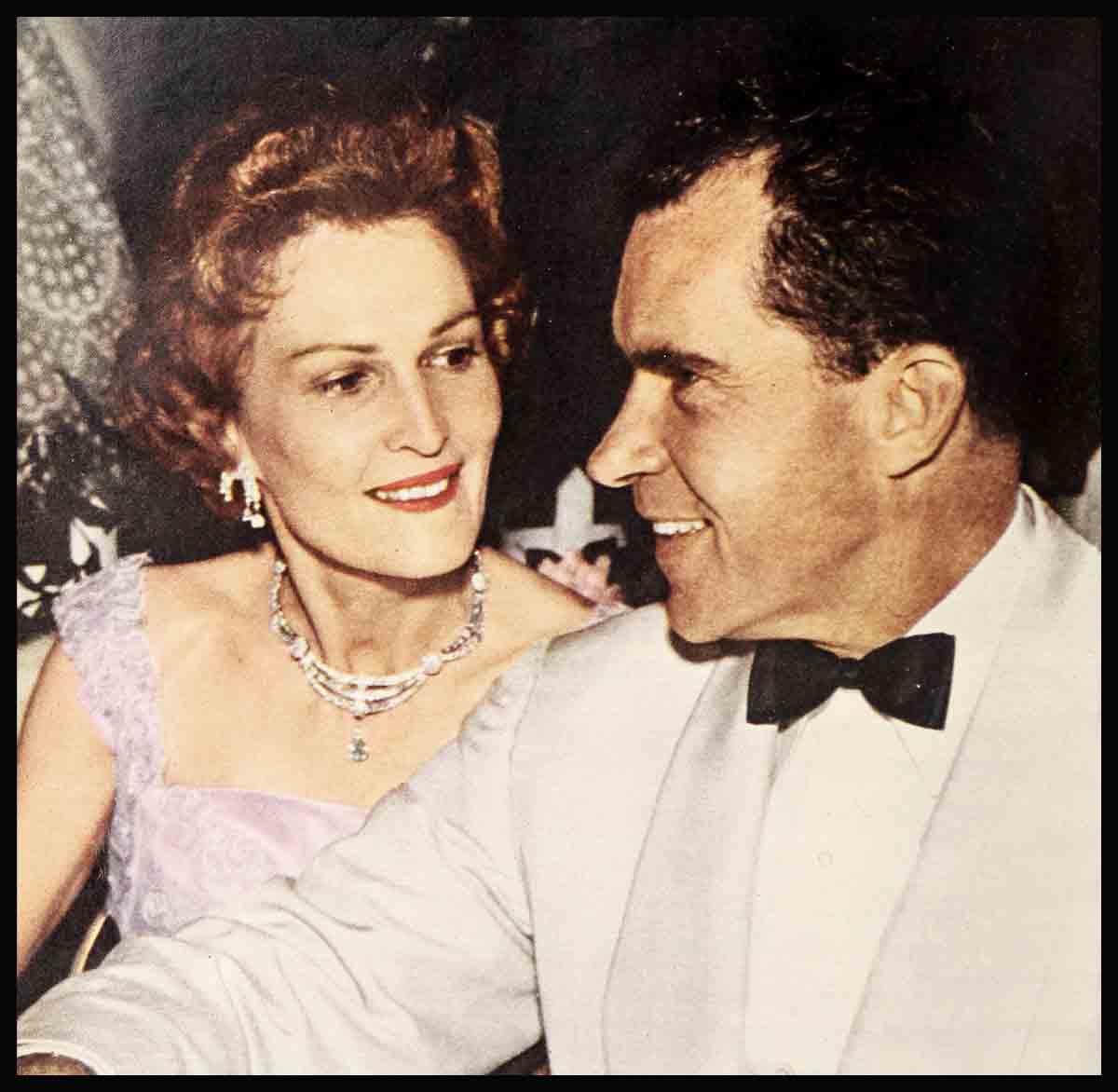

No Comments